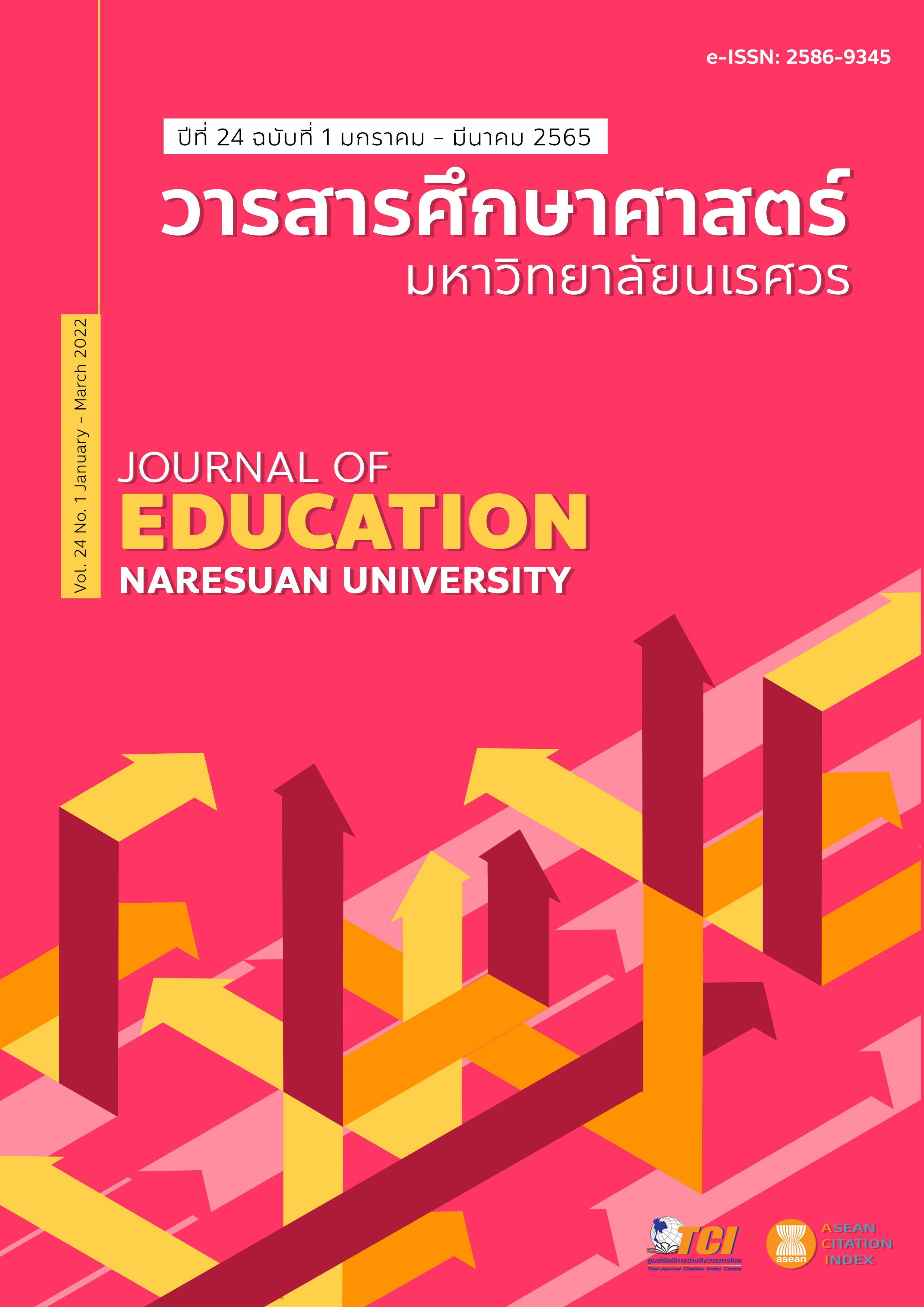AN INSTRUCTIONAL INNOVATION TO STRENGTHEN COMPREHENSIVE HUMANIZATION FOR HIGHER EDUCATION STUDENTS: SOFT SKILLS FOR THE DIGITAL SOCIETY
Main Article Content
Abstract
This article presents the results of applying an instructional model designed to strengthen comprehensive humanization for higher education students by using CELER Model. The CELER Model consists of five steps in
the process, including 1) Creation of atmosphere (C), 2) Experience review (E), 3) Learning for living (L), 4) Empowerment (E), and 5) Reflection (R). Results of applying the CELER Model indicated that the emotional characteristics of comprehensive humanization led to a more positive attitude to other people. The CELER Model post-test (M = 4.31, SD = .37) was higher than the pre-test (M = 3.96, SD = .40) with statistical significance at .05. Most of the students were completely satisfied and very satisfied by the CELER Model in every course outline, especially Course Outline 4, which showed that the students were completely satisfied in every step. When examining each step, it was reported that 84.38 percent of students were completely satisfied (M = 4.84, SD = 0.36) in Learning for living (L), which was higher than that of other processes. The results from opinion surveys and focus group discussions of the students showed that the model could strengthen positive attitudes, understanding oneself and others, working with others smoothly, creative thinking and problems solving in complicated situations. These characteristics are soft skills which are significant in the 21st century skills.
Article Details

This work is licensed under a Creative Commons Attribution-NonCommercial-NoDerivatives 4.0 International License.
The owner of the article does not copy or violate any of its copyright. If any copyright infringement occurs or prosecution, in any case, the Editorial Board is not involved in all the rights to the owner of the article to be performed.
References
Amatyakul, K. (2013). Neo-humanist. Retrieved April 9, 2018, from https://bit.ly/2KFwNcF
Cobo, C. (2013). Mechanisms to identify and study the demand for innovation skills in world-renowned organizations. On the Horizon, 21(2), 96-106.
Department of Mental Health. (2018). Mental health journal: Shocked! Bullying among children in Thailand is in the 2nd place in the world. Retrieved October 30, 2017, from https://www.dmh.go.th/newsdmh/view.asp?id=27488
Dixon, J., Belnap, C., Albrecht, C., & Lee, K. (2010). The importance of soft skills. Corporate Finance Review, 14(6), 35-38.
Inta, M. (2019). Soft skills: The essential skills to be professionalism of the modern teachers. Journal of Education, 20(1), 153-167.
Knowles, M. S. (1980). The modern practice of adult education: From pedagogy to andragogy (2nd ed). New York: Cambridge Books.
Leelaswatanakij, L. (1999). Monitoring trainees' performance on young children development based on neo-humanist to provide welfare for pre-school children (Master thesis). Bangkok: Thammasat University.
Mangkhang, C. (2017). Ideology: Social studies curriculum for all (3rd ed.). Bangkok: Chulalongkorn University Press.
National Science and Technology Development Agency (NSTDA). (2015). Pedagogy and Andragogy. Retrieved April 16, 2018, from https://www.nstda.or.th/th/nstda-knowledge/2835-pedagogy-andragogy
Ninchaikowit, T., & Juntrasook, A. (2009). Art in transformative learning: A manual of contemplation process. Bangkok: Contemplative Education Center.
Ninchaikowit, T. (2008). Book of Academic Conference Articles of 2008 on contemplative education: Education for humanization. Nakhon Pathom: Contemplative Education Center, Mahidol University.
Panich, V. (2015). Transformative learning. Bangkok: S. R. Printing Mass Product.
Phra Promkunaporn (P. A. Payutto). (2013). Sustainable development (13th ed.). Bangkok: Komol Keemthong Foundation.
Robles, M. M. (2012). Executive perceptions of the top 10 soft skills needed in today's workplace. Business Communications Quarterly, 75(4), 453-465.
Royal Thai Government Gazette. (2019). Ministry of Education announcement on Thai Qualification Framework for Higher Education, Department of Education (four-year curriculum) (Vol.136 Special 56D).
Rukspollmuang, C. (2014). Rights and freedom in education: Foundation of social education and law. Bangkok: Winyuchon.
Saksung, O. (2009). Malcolm Knowles' theory of Andragogy. Retrieved May 4, 2018, from https://www.moe.go.th/moe/th/news/detail.php?NewsID=9042&Key=news_research
Sindhuprama, V. (n.d.). Education management in accordance with political economy. A handout of 16th session of course 050104 Man and the Modern World. Chiang Mai: Faculty of Humanities, Chiang Mai University.
Sinlarat, P. (2012). Basic educational philosophy. Bangkok: Chulalongkorn University Press.
The Earth Charter. (2000). Values and principles to foster a sustainable future. Retrieved May 21, 2019, from http://earthcharter.org/discover/the-earth-charter
UNESCO. (2015). Global Citizenship Education Topics and learning objective. Paris: UNESCO.
Wongkitrungruang, W., & Jittarerk, A. (2013). Skills of new future: Education for the 21st century (2nd ed.). Bangkok: Open worlds.


